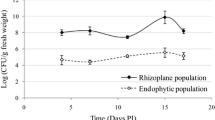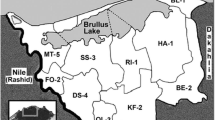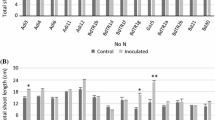Abstract
Spring wheat (Triticum aestivum L.) and pea (Pisum spp.) genotypes were tested for reaction to root inoculation with rhizosphere bacteria affecting plant growth. Plant response was studied in greenhouse experiments after treatment of seedlings with bacteria suspended in nutrient broth. Significant genotype variation was found in both wheat and pea in terms of shoot dry weight and severity of bacteria-induced leaf symptoms. For most bacterial isolates tested, there was good correlation between ratings of leaf symptoms 7 to 14 days after inoculation and growth inhibition measured after four weeks. Interactions between isolates and plant genotypes were significant in both wheat and pea (P=0.0024 and 0.0001, respectively), but genotypes with sensitivity or tolerance to most isolates could be distinguished. In an outdoor pot experiment, two of the bacterial isolates caused delayed plant development and differential decreases in grain yield of wheat genotypes. The hypothesis that the reaction of wheat genotypes to the tested becteria was related to their influence on bacterial establishment in the rhizosphere could not be substantiated.
Similar content being viewed by others
References
Alström S 1987 Factors associated with detrimental effects of rhizobacteria on plant growth. Plant and Soil 102, 3–9.
Avivi Y and Feldman M 1982 The response of wheat to bacteria of the genus Azospirillum. Isr. J. Bot. 31, 237–245.
Azad H R, Davis J R, Schnathorst W C and Kado C I 1985 Relationships between rhizoplane and rhizosphere bacteria and Verticillium wilt resistance in potato. Arch. Microbiol. 140, 347–351.
Bergan T 1981 Human-and animal-pathogenic members of the genus Pseudomonas.In The Prokaryotes. Eds. M P Starr, H Stolp, H G Trüper, A Balows and H G Schlegel. Vol 1, pp 666–700. Springer-Verlag, Berlin.
Burr T J and Caesar A 1984 Beneficial plant bacteria. Critical Rev. Plant Sci. 2, 1–20.
Buxton E W 1957 Differential rhizosphere effects of three pea cultivars on physiological races ofFusarium oxysporum f.pisi. Trans. Br. Mycol. Soc. 40, 305–317.
Campbell J N, Conn K, Sorlie L and Cook F D 1986 Inhibition of growth in canola seedlings caused by an opportunisticPseudomonas sp. under laboratory and field conditions. Can. J. Microbiol. 32, 201–207.
Döbereiner J and Campelo A B 1971 Non-symbiotic nitrogen fixing bacteria in tropical soils. Plant and Soil, Special Volume, 457–470.
Elliott L F and Lynch J M 1984 Pseudomonads as a factor in the growth of winter wheat (Triticum aestivum L.). Soil Biol. Biochem. 16, 69–71.
Elkan G H 1962 Comparison of rhizosphere microorganisms of genetically related nodulating and non-nodulating soybean lines. Can. J. Microbiol. 8, 79–87.
Fredrickson J K and Elliott L F 1985 Colonization of winter wheat roots by inhibitory rhizobacteria. Soil. Sci. Soc. Am. J. 49, 1172–1177.
Gardner J M, Chandler J L and Feldman A W 1984 Gowth promotion and inhibition by antibiotic-producing fluorescent pseudomonads on citrus roots. Plant and Soil 77, 103–113.
Gerhardson B, Alström S and Rämert B 1985 Plant reactions to inoculation of roots with fungi and bacteria. Phytopathol. Z. 114, 108–117.
Hornby D and Ullstrup A J 1967 Fungal populations associated with maize roots. Composition and comparison of mycofloras from genotypes differing in root rot resistance. Phytopathology 57, 869–875.
Kloepper J W, Schroth M N and Miller T D 1980. Effects of rhizosphere colonization by plant growth-promoting rhizobacteria on potato plant development and yield. Phytopathology 70, 1078–1082.
Millet E, Avivi Y and Feldman M 1984 Yield response of various wheat genotypes to inoculation withAzospirillum brasilense. Plant and Soil 80, 261–266.
Millet E, Avivi Y and Feldman M 1985 Effects of rhizospheric bacteria on wheat yield under field conditions. Plant and Soil 86, 347–355.
Neal J L Jr., Atkinson T G and Larson R I 1970 Changes in the rhizosphere microflora of spring wheat induced by disomic substitution of a chromosome. Can. J. Microbiol. 16, 153–158.
Neal J L Jr., Larson R I and Atkinson T G 1973 Changes in rhizosphere populations of selected physiological groups of bacteria related to substitution of specific pairs of chromosomes in spring wheat. Plant and Soil 39, 209–212.
Peterson E A and Rouatt J W 1967 Soil microorganisms associated with flax roots. Can. J. Microbiol. 13, 199–203.
Rai R, Prasad V and Shukla I C 1984 Interaction between finger millet (Eleusine coracana) genotypes and drug-resistant mutants ofAzospirillum brasilense in calcareous soil. J. Agric. Sci. Camb. 102, 521–529.
Rennie R J and Larson R I 1979 Dinitrogen fixation associated with disomic chromosome substitution lines of spring wheat. Can. J. Bot. 57, 2771–2775.
Schroth M N and Hancock J G 1981 Selected topics in biological control. Annu. Rev. Microbiol. 35, 453–476.
Suslow T V and Schroth M N 1982 Role of delecterious rhizobacteria as minor pathogens in reducing crop growth. Phytopathology 72, 111–115.
Timonin M I 1940 The interaction of higher plants and soil micro-organisms. II. Study of the microbial population of the rhizosphere in relation to resistance of plants to soil-borne diseases. Can. J. Res. Sect. C 18, 307–317.
Author information
Authors and Affiliations
Rights and permissions
About this article
Cite this article
Åström, B., Gerhardson, B. Differential reactions of wheat and pea genotypes to root inoculation with growth-affecting rhizosphere bacteria. Plant Soil 109, 263–269 (1988). https://doi.org/10.1007/BF02202093
Received:
Revised:
Issue Date:
DOI: https://doi.org/10.1007/BF02202093




